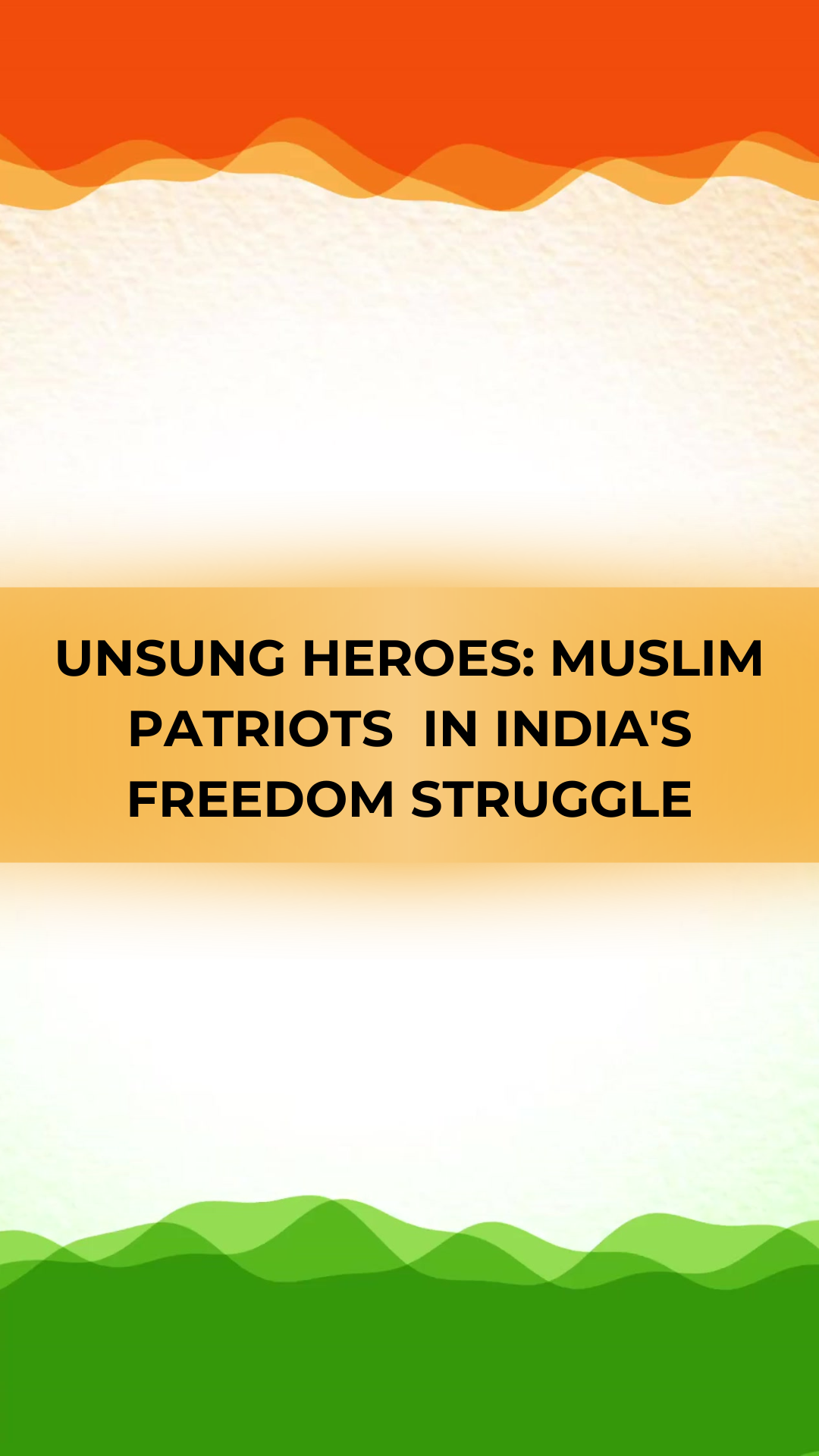
Aug 16 , 2024
Celebrating the Unsung Muslim Freedom Fighters of India's Independence Movement
India's journey to independence is marked by the bravery, sacrifice, and resilience of countless individuals from diverse backgrounds. Among these were several **Muslim freedom fighters** who played pivotal roles in the struggle against British colonial rule. Despite their significant contributions, these **unsung heroes of Indian freedom struggle** are often less recognized in popular narratives. This blog highlights the stories of these **Muslim freedom fighters of India**, their unwavering commitment to India's independence, and their lasting impact on the nation.
Introduction: The Role of Muslim Freedom Fighters in India's Independence
The Indian independence movement was a collective effort that transcended religious, cultural, and regional boundaries. Muslim freedom fighters were instrumental in this struggle, bringing their unique perspectives, leadership, and courage to the forefront. From leading non-violent movements to participating in revolutionary activities, these individuals left an indelible mark on India's history. In this blog, we will delve into the lives of some of these remarkable figures, exploring their contributions and the legacy they left behind.
1. Maulana Abul Kalam Azad: The Scholar and Leader of Indian Independence
Muslim scholar and freedom fighter Maulana Abul Kalam Azad was not just a prominent Muslim leader but also a towering figure in the Indian National Congress. As a scholar and a freedom fighter, Azad was deeply involved in major movements like the Non-Cooperation Movement the Civil Disobedience Movement and the Quit India Movement. His leadership extended beyond political activism; he was instrumental in shaping the educational landscape of independent India as the first Minister of Education.
Impact: Azad's vision for a united, secular India and his dedication to education have left a lasting legacy that continues to influence the country today.
2. Khan Abdul Ghaffar Khan: The Frontier Gandhi
Khan Abdul Ghaffar Khan, also known as the Frontier Gandhi, was a close associate of Mahatma Gandhi and a staunch advocate of non-violence. He founded the Khudai Khidmatgar ("Servants of God") movement, which sought to achieve independence through peaceful means. His commitment to non-violence and his efforts to unite the people of the North-West Frontier Province under the banner of peaceful resistance made him a revered figure in the independence struggle.
Impact:Khan's legacy as a non-violent Muslim freedom fighter continues to inspire movements for peace and justice worldwide.
---
3. Ashfaqulla Khan: The Revolutionary Hero of Kakori
Ashfaqulla Khan, a revolutionary freedom fighter, played a crucial role in the Kakori Train Robbery, an audacious attempt to loot a government treasury to fund the independence struggle. As a member of the Hindustan Republican Association (HRA), Khan's commitment to the cause was unwavering, even in the face of death. He was arrested and executed by the British, becoming a martyr for the freedom movement.
Impact:Ashfaqulla Khan's bravery and sacrifice are a testament to the indomitable spirit of India's revolutionary freedom fighters.
---
4. Maulana Hasrat Mohani: The Poet Who Demanded Complete Independence
Maulana Hasrat Mohani, a freedom fighter, poet, and a member of the Indian National Congress, was the first to demand "Purna Swaraj" or complete independence from British rule, a radical idea at the time. Mohani was also a key figure in the Khilafat Movement and was imprisoned several times for his activism. His poetry, rich with themes of freedom and resistance, inspired many during the independence movement.
Impact: Mohani's call for complete independence laid the foundation for the eventual demand that led to India's freedom.
---
5. Begum Hazrat Mahal: The Warrior Queen of 1857
Begum Hazrat Mahal, the wife of Nawab Wajid Ali Shah of Awadh, was a key figure in the Indian Rebellion of 1857. After her husband's exile, she led the forces of Awadh against the British, displaying remarkable leadership and courage. Despite facing overwhelming odds, Begum Hazrat Mahal fought fiercely to protect her kingdom and resist British domination.
Impact: Begum Hazrat Mahal's legacy as a **female freedom fighter** and warrior queen continues to inspire women leaders in India and beyond.
---
6. Syed Ahmed Khan: The Reformer Who Shaped Modern Education
Syed Ahmed Khan, a reformer, educationist, and political leader, played a crucial role in modernizing education among Muslims in India. He founded the **Aligarh Muslim University**, which became a key institution in promoting modern education. His efforts not only uplifted the Muslim community but also contributed significantly to the broader Indian society by fostering a new generation of educated leaders.
Impact: Syed Ahmed Khan's educational reforms laid the groundwork for a more inclusive and progressive India.
---
7. Rafi Ahmed Kidwai: The Loyalist of Nehru and a Minister of Independent India
Rafi Ahmed Kidwai, an Indian freedom fighter and a member of the Indian National Congress, closely associated with Jawaharlal Nehru, played an active role in the Non-Cooperation and Civil Disobedience Movements. Later, he served as a minister in independent India. Kidwai was known for his integrity and dedication to the nation.
Impact: Kidwai's contributions to India's freedom and his service in the early years of independence helped shape the country's governance.
---
8. Badruddin Tyabji: The First Muslim President of the Indian National Congress
Badruddin Tyabji , the third President of the Indian National Congress and a prominent lawyer, was the first Muslim to preside over the Congress. He played a vital role in bridging the gap between Hindus and Muslims during the freedom struggle. Tyabji's efforts in the early years of the Congress helped set the stage for a united front against British rule.
Impact: Tyabji's leadership was instrumental in fostering unity and cooperation among India's diverse communities.
---
Conclusion: Honoring the Legacy of Muslim Freedom Fighters in India
The contributions of Muslim freedom fighters to India's independence movement are a vital part of the nation's history. These leaders, each in their unique way, fought for a free and united India, often at great personal risk. Their legacies continue to inspire future generations, reminding us of the diverse and collective efforts that shaped modern India.
